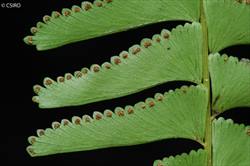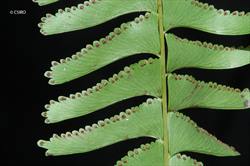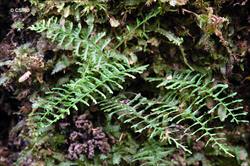Lindsaeaceae
Australian Tropical Ferns and Lycophytes - Online edition
Lindsaea repens



Lindsaea repens (Bory) Thwaites
Link to Australian Plant Name Index for publication details and synonyms: https://id.biodiversity.org.au/name/apni/113760
Climbing Lindsaea
Rhizome high-climbing, 1.5–3 mm diam.; stele strongly dorsiventral; scales to 5 mm long, persistent, later deciduous and exposing a ±dull rhizome. Fronds monomorphic. Stipes distant, 1–5 cm long, much shorter than lamina, stramineous to pale-brown, darker towards base. Lamina 1-pinnate, linear, to 70 cm long and 3 mm wide, gradually and strongly reduced towards base. Pinnules broadly asymmetrically flabellate, sessile to shortly stalked, 15–30 mm long, herbaceous, closely spaced, gradually reduced and becoming contiguous or pinnatifid towards apex; outer margin shallowly incised; veins free, 1–2 times forked. Juvenile lamina with deeply lobed pinnae. Sori broken by marginal incisions. Spores trilete, pale greenish or pale brown, smooth.
Localised at a few ever-wet sites between Iron Range and Fraser Island QLD. Also widespread in the Palaeotropics.
Terrestrial, lithophytic or hemi-epiphytic climber. Growing in riparian or wetland rainforest.
A species comprised of multiple varieties sensu Kramer K.U. & McCarthy P.M. (1998) Lindsaeaceae in Flora of Australia Vol. 48 pp. 228-240.
Difficult to propagate and establish.
The climbing hemi-epiphytic habit distinguishes this species from all other Australian Lindsaea.
Field AR, Quinn CJ, Zich FA (2022) Australian Tropical Ferns and Lycophytes. apps.lucidcentral.org/fern/text/intro/index.htm (accessed online INSERT DATE).
Field AR, Quinn CJ, Zich FA (2022) ‘Platycerium superbum’, in Australian Tropical Ferns and Lycophytes. apps.lucidcentral.org/fern/text/entities/platycerium_superbum.htm (accessed online INSERT DATE).







